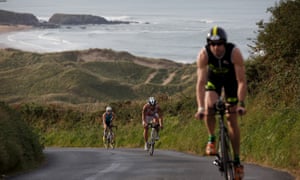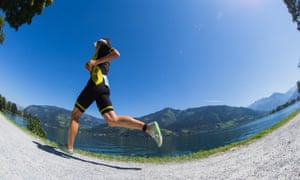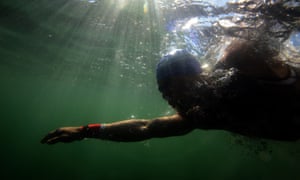
At 7am on Sunday morning, nearly 2,500 athletes in wetsuits and green swim hats will gather on Tenby’s North beach to take the plunge into a chilly grey sea.
About nine hourslater, one very tired athlete – after a 2.4-mile swim, a 112-mile bike ride and a marathon run – will break the tape to claim this year’s Ironman Wales title.
The next morning many will be up early again, to sign up to do it all again next year – and hand over their £418 fee (£395 plus a 6% entry fee).
Endurance sports are now big business. Events such as Ironman, Tough Mudder, marathons, triathlons and road cycle races are booming.
Competitors invest hours of training time and huge entry entry fees to drag themselves across the finish line.
Big investors are beginning to sit up and take notice. The World Triathlon Corporation, owner of Ironman, was last month snapped up by China’s biggest commercial property company, the Dalian Wanda Group, for $650m (£421m). The group is controlled by Wang Jianlin, China’s richest man, whose fortune is estimated by Forbes to be about $26bn.
Jianlin knows a thing or two about making money, and a sport with no stadium costs and whose events are largely staffed by volunteers is an appealing business model. Ironman is expected to rake in more than $180m this year and has been growing at more than 20% a year.

Jianlin – who also owns Atlético Madrid – now wants to make even more money by rolling out the Ironman brand, which currently operates more than 200 races in locations ranging from Tenby to Buenos Aires, to the untapped and potentially huge Chinese market.
“Triathlons are on the cusp of explosion in China,” said Dalian Wanda in a statement.
According to British Triathlon, the numbers of people participating in UK triathlon events has ballooned over the past six years, from about 120,000 in 2009 to more than 196,000 last year.
In the US the triathlon market was estimated to be worth $3bn last year, according to a study by MultiSport Research (MSR). It also estimates Britain’s multisport community generated revenue of £363m last year – up 14% on 2013.
Aside from the big entry fees, there are other substantial costs to becoming an Ironman or Ironwoman.
The UK survey, conducted in the first quarter of 2015, found that the average total spend per person who takes part was £2,790.

Gary Roethenbaugh, director at MSR, reckons the average salary for triathletes is £47,500 ,75% above national average, while the average age is 41, with a high proportion of professionals and entrepreneurs competing.
Triathletes, he says, are also more willing to embrace technology to help them improve their performance, something that’s not lost on the growing number of large corporations that want to cash in on the growing market.
“You have a group of determined individuals, an attractive demographic, and a bunch of people who are prepared to embrace new technology – that’s attractive to corporations,” said Roethenbaugh.
Small businesses are also carving out a niche in the market. Cranc Cyclesports, based in Carmarthen, just 26 miles from Tenby, was set up two years ago to serve the burgeoning demand for state-of-the-art bike fits, sales of high-end road bikes and top notch service and maintenance.
Former army officer and PE teacher Andy Rowlands, founder of Cranc and a triathlete for many years, spotted a gap in the market for bike fits and is now the only bike shop in Wales to operate the Retul system, used by Team Sky.
The system was a big investment – costing £20,000, including all the training. It takes precise measurements and uses video footage of a rider on the bike.

The system’s software helps to analyse the rider’s body geometry and find their optimum riding position. Rowlands and his team then re-jig the bike accordingly – this may mean ordering new parts, longer or shorter seat post, wider bars etc. A bike fit costs £175 and takes around three hours to complete.
Cranc, he says, would survive without the boost it gets from having the Ironman event “on the doorstep”, but he admits it is a big part of his business.
“About 40% of the customers that have a bike fit are doing Ironman or they are triathletes,” he says. “They also account for about 25% of sales.”
“The week after Ironman Wales last year, we probably had 20 people come in saying ‘I want a bike and a fit’. Part of enjoying the sport is buying new kit,” he said. “How many golfers have got three or four drivers in the garage? And there’s nothing wrong with the first one they bought.”
Rowlands believes endurance sports, like cycling, triathlon and Ironman, have become the new golf for middle-aged men and figures from Sports Marketing Surveys support his hunch. Golf has suffered a precipitous slump in participation in Britain in the last decade. There were more than 4m golfers in 2006, but by last year the numbers striding the fairways and greens was down to just 3.3m.
The growing army of middle class, middle aged devotees to triathlon has also bolstered sales of lighter carbon frames. Bike brands like Giant, Cannondale, Look, Colnago and Bianchi are in big demand.
Nick Rusling, chairman of the Triathlon Industry Association and chief executive of Human Race, is confident the sector will continue to snowball in size as people strive to stay fitter and healthier for longer.
Rusling started working for Human Race four years ago when his company, Participate Sport, merged with Human Race – and it is now the UK’s biggest organiser of cycling and running races, duathlons, triathlons and open water swimming. He concluded: “Opportunities are out there for more businesses to be created.”
• This article was amended on 14 September 2015. An earlier version said that Nick Rusling founded Human Race four years ago. Human Race was founded by John Lunt in 1990, and merged with Rusling’s company, Participate Sport, four years ago.
Source: Read Full Article